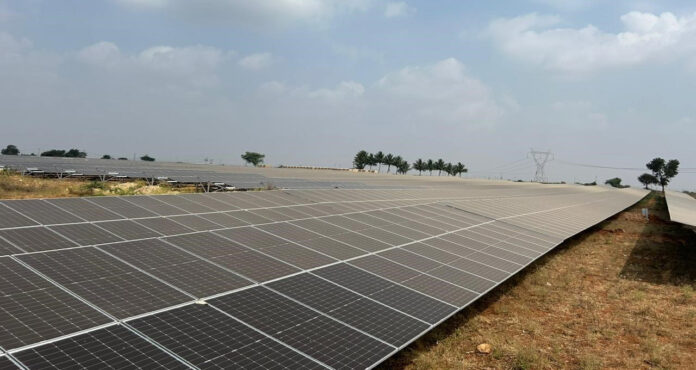APM Terminals Mumbai (GTI) has transitioned to 80% renewable electricity this month by commissioning a 10.65 MW captive solar power plant under a Power Purchase Agreement (PPA) with O2 Power.
This significant step marks a substantial advancement in GTI’s journey toward operating as a renewable-energy-powered container terminal.
The captive solar plant is expected to produce over 21 GWh of electricity annually, sufficient to power critical infrastructure such as the terminal’s quay cranes and reefers. Unlike traditional renewable energy sourced from the grid, a captive solar power plant is implemented for internal consumption.
Unmesh Sharad Wagh, IRS, Chairman, Jawaharlal Nehru Port Authorities (JNPA), stated, “The implementation of solar power at Gateway Terminals India is a transformative step, delivering a substantial total capacity of 10.65MWp. This strategic initiative is projected to significantly cut down pollution. This aligns with our vision of making all our terminals green in the next two years, emphasising the use of renewable energy for a sustainable logistics supply chain and operational excellence. By spearheading this transition, JNPA once again solidifies its role as an innovator and leader in the port and maritime industry.”
This development is particularly noteworthy given that India’s reliance on high-emission coal-fired electricity reached 80% in January 2024, as reported by Reuters. By adopting renewable energy, APM Terminals Mumbai anticipates reducing its CO2 equivalent emissions by more than 15,000 tonnes annually, achieving a 41% decrease in carbon emissions.
“At APM Terminals Mumbai, we are integrating our global decarbonisation ambitions with the Government of India’s Harit Sagar guidelines and ambitious targets outlined by JNPA in the ever-growing renewable energy segment. We are glad to partner with O2 Power to lift the standard of decarbonisation across our industry,” said Sunay Mukerjee, COO at APM Terminals Mumbai.
In addition to this initiative, GTI plans to collaborate with the Jawaharlal Nehru Port Authorities (JNPA) to introduce Shore Power for vessels calling at GTI. Furthermore, GTI is piloting an electric internal transfer vehicle (ITV) and is committed to supporting JNPA’s vision of zero-emission trucking. Previously, in 2016, APM Terminals Mumbai became one of India’s pioneering terminals to install solar panels on various facilities, generating 361,000 kWh units per year.
Globally, APM Terminals has committed to achieving full net zero emissions by 2040 and aims to reduce its scope 1 and 2 emissions by 65% by 2030 compared to 2022 levels. To accomplish this, the company has developed tailored decarbonisation roadmaps, addressing the diverse challenges of container handling equipment.
The partnership between APM Terminals Mumbai and O2 Power, one of India’s fastest-growing renewable energy firms owned by EQT Infrastructure and Temasek, is set to enhance sustainability efforts, promoting long-term economic and environmental resilience for both organizations and society at large.







